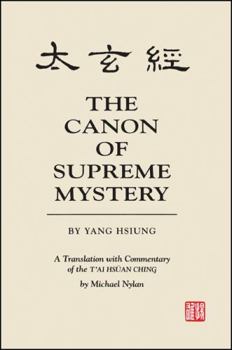The Canon of Supreme Mystery by Yang Hsiung: A Translation with Commentary of the t'Ai Hsuan Ching by Michael Nylan
This is a translation, with a commentary and a long contextualizing introduction, of the only major work of Han (206 B.C. to 220 A.D.) philosophy that is still available in complete form. It is the first translation of the work into a European language and provides unique access to this formative period in Chinese history. Because Yang Hsiung's interpretations drew upon a variety of pre-Han sources and then dominated Confucian learning until the twelfth century, this text is also a valuable resource on early Chinese history, philosophy, and culture beyond the Han period. The T'ai hs an is also one of the world's great philosophic poems comparable in scale and grandeur to Lucretius' De rerum naturum. Nathan Sivin has written that this is one of the titles on the short list of Chinese books every cultivated person should read. Han thinkers saw in this text a compelling restatement of Confucian doctrine that addressed the major objections posed by rival schools including Mohism, Taoism, Legalism and Yin-Yang Five Phase Theory. Since this Han amalgam formed the basis for the state ideology of China from 134 B.C. to 1911, an ideology that in turn provided the intellectual foundations for the Japanese and Korean states, the importance of this book can hardly be overestimated.
Format:Hardcover
Language:English
ISBN:0791413950
ISBN13:9780791413951
Release Date:June 1993
Publisher:State University of New York Press
Length:680 Pages
Weight:2.35 lbs.
Customer Reviews
0 rating





